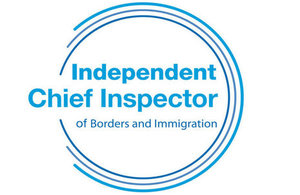The Chief Inspector finds that Border Force operations at Heathrow Airport have improved
The Chief Inspector has found that Border Force operations at Heathrow Airport have improved in a number of areas.

The Independent Chief Inspector of Borders and Immigration’s latest report on Border Force operations at Heathrow Airport found that its performance had improved in a number of areas since the 2012 investigation into border security checks. For the most part, Border Force was efficient and effective in delivering its core functions. However, issues remained in relation to management oversight and assurance.
Border Force is responsible for securing the border by carrying out immigration checks and customs controls for people and goods entering the UK. This inspection focused primarily on Border Force operations at Terminal 5, the airport’s busiest terminal handling over 13 Million passenger arrivals in the 12 months to April 2014.
The Chief Inspector found that:
- all Border Force officers (BFOs) were aware of and conducting security checks in accordance with the Border Force operating mandate
- BFOs interacted professionally with passengers at the immigration and customs control points
- the majority of decisions whether to grant or refuse entry to the UK were made in accordance with policy and guidance
- improvements had been made in relation to detection of forged travel documents
- staffing had been increased and this, coupled with better resource management oversight, had improved customer service. As a result, passenger queues were being processed more efficiently
- Border Force had introduced a number of initiatives in relation to safeguarding individuals, including steps to safeguard and promote the welfare of children.
However, the Chief Inspector also found that:
- as with previous port inspections, there were serious weaknesses in Border Force’s creation, maintenance and storage of records. This meant it was unable, in some cases, to demonstrate that actions taken by BFOs were lawful, proportionate or in compliance with policy and guidance
- some BFOs were not always making a recommendation to the watchlist information and control unit (WICU) to delete an entry when it was no longer valid. This meant some passengers were being needlessly delayed, and staff were wasting time on nugatory checks
- Border Force was not maintaining accurate passenger detention records in all instances and in some cases, it was unable to demonstrate that the initial detention and the time spent in detention were necessary
- Border Force was unable to demonstrate the justification for intercepting passengers in the customs channels in the majority of the cases sampled as part of the inspection, and also could not show that these passengers had been informed of their rights
- BFOs in the customs channels were not always adhering to guidance, which required them to complete notebook records at the time, or shortly after, an event had taken place. In addition, passengers stopped in the customs channels were not being asked to sign notebook entries
- BFOs were not always enforcing the law when passengers travelling from outside the EU were detected carrying goods in excess of their duty free allowance in the customs channels
Independent Chief Inspector of Borders and Immigration, David Bolt, said:
The inspection found that Border Force at Heathrow had made a number of improvements since 2012 and, for the most part, was performing effectively and efficiently.
However, this positive picture in terms of core business is somewhat let down by failings in basic procedures and practices, including record keeping, which management oversight and assurance should have identified and tackled.
Border Force needs to give sufficient priority to addressing this issue to ensure it does not continue to be a cause for concern.
The Chief Inspector made 6 recommendations for improvement. These included that Border Force ensures all searches of person are justified, proportionate and conducted in accordance with the law and guidance, with proper documentary records maintained, and that all detection staff enforce the law where they discover passengers in possession of goods in excess of their duty free allowances.
Background
-
The report was laid in Parliament on 16 July 2015
-
David Bolt took up the post of Independent Chief Inspector on 1 May 2015
-
The 2012 Investigation was conducted at the request of the Home Secretary following the disclosure that some checks may have been suspended without the approval of ministers